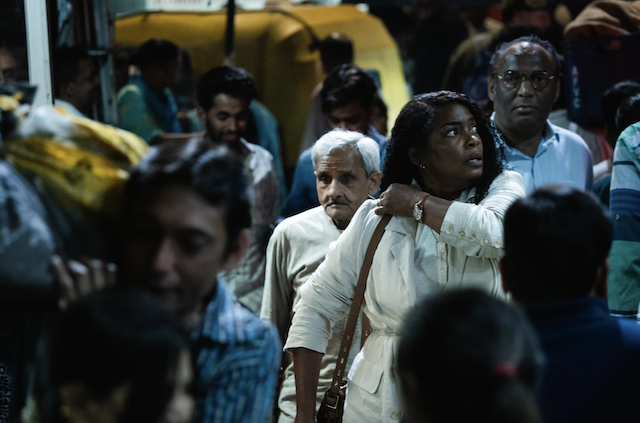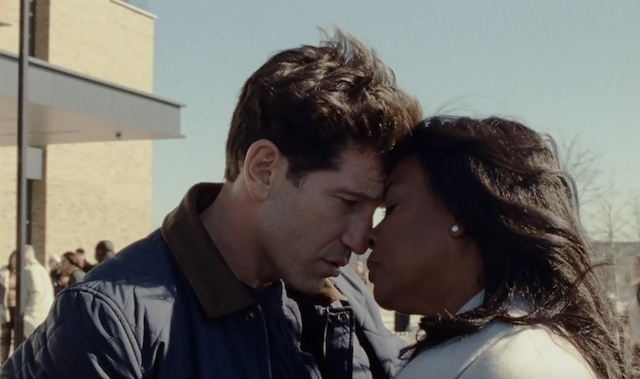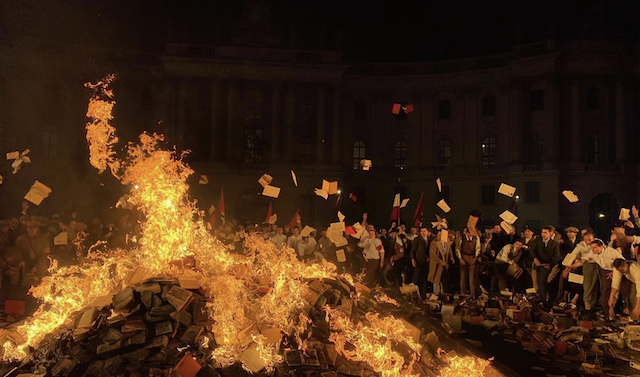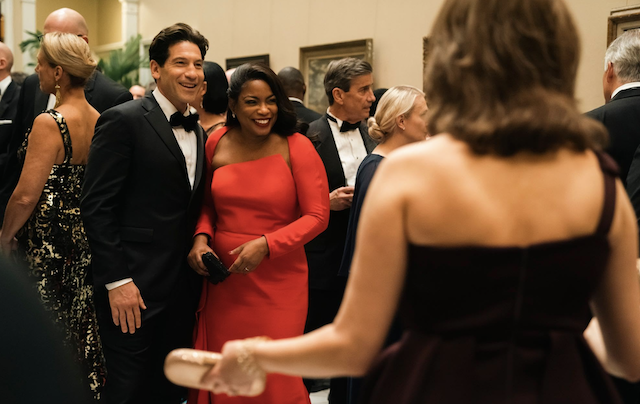
@Photo by Atsushi Nishijima – © Atsushi Nishijima
Synopsis : While grappling with tremendous personal tragedy, Isabel sets herself on a path of global investigation and discovery. Despite the colossal scope of her project, she finds beauty and bravery while crafting one of the defining American books of our time.
Rating: PG-13 (Violence|Smoking|Racism|Language|Some Disturbing Images|Thematic Material)
Genre: Drama
Original Language: English
Director: Ava DuVernay
Producer: Paul Garnes, Ava DuVernay
Writer: Ava DuVernay
Release Date (Theaters): Wide
Runtime:
Distributor: NEON
Production Co: ARRAY Filmworks

Photo by Atsushi Nishijima – © Atsushi Nishijima
Press Conference with Director Ava DuVernay and Actors Aunjanue Ellis-Taylor, Niecy Nash, Finn Wittrock
Q : How did you decide that Origin was going to be your new movie?
Ava DuVernay – The film is based on the book Caste by the Pulitzer Prize winner Isabel Wilkerson. I was so fascinated by her thesis in this book, which basically states that there is something underneath all of the “isms” that we experience in our lives across the world and across time. There’s this thing underneath it all called caste. I thought it was a provocative idea, so I read the book several times, but as I was reading the book I realized that there was more that I wanted to say about the story than the book.
I needed there to be a character that we followed who could animate the ideas in the book. I decided that would be Wilkerson herself. So I approached her, I asked her if she’d be willing to allow me to make a film about her life and work. It was for her a very challenging time while she was writing the book because she lost the three closest people to her in her life. And so the film, through the embodiment of Aunjanue Ellis-Taylor, allows us to follow Isabel through these losses, through the tragedy and the triumph as we learn. In this way through the writing of Caste we can also experience a beautiful love story about a woman falling in love with life as she deals with all its trials and tribulations.
Q : How did you team up with Ava in order to compose this breathtaking character?
Aunjanue Ellis-Taylor – I was aware of the book Caste because I have followed Ms. Wilkerson’s work, it is extraordinary and granted her two Pulitzer Prizes. She is one of the most important voices in our American dialogue about who we are in this country and in this world. Then I heard rumors that Ava DuVernay was going to adapt it, but I was like:”This kind of miracle will never happen in my life.”
Anyway, she talked to me about it, and explained what she wanted to do: go to India, go to all these places, and she wanted to do it guerrilla style because she didn’t have a lot of money. That was to me an extension of the spirit of the book and I wanted to be a part of that. When I started working with Ava at the series When They See Us I found out she’s like a kind of freedom fighter director. I truly wanted to continue this kind of collaboration.
Q : What was your first conversation with Ava about Origin?
Niecy Nash – The task that our fearless leader gave me was for me to find a way through my character to become the audience, to ask the questions that the audience would ask. Make it plain: “What does that actually mean?” Unpack it a little more. The second was to bring a little lightness, some light moments into this heavy work, which is not easy to do, I might add.
You really have to find sweet spots and very tender moments so that it doesn’t stick out so much in the film. Working with Aunjanue has been amazing. I understood that my duty was to support her in whatever way that I could because she has so much emotional heavy lifting. One of my favorite parts in the movie is when we sat at the table sharing photographs: Ava wanted to enter on us laughing so in order to lift her during the day, I had to come up with creative stories to make her laugh in real life, so that these laughs would be genuine on camera.

Photo by Atsushi Nishijima – © Atsushi Nishijima
Q : Has it been difficult for you to shoot the flashback scenes, especially the infamous burning of books in Berlin during the Nazi regime?
Finn Wittrock – I guess intense would be the word. I was only in Savannah for I think a little over a week and it was honestly some of the hardest work I’ve ever done in terms of speaking actual German, learning this dance and the easy part which was falling in love with Victoria Pedretti. I felt truly transported as soon as I walked onto the set: every detail was figured out and Ava had an energy that demands you to kind of come to her level, which is like a pure storytelling soul.
We put ourselves into this story a thousand percent. What’s amazing to me about Origin is we’re in different places, different times and yet the movie feels completely cohesive. Everything seems like it’s part of one larger story, that was the amazing quality about the script. Ava was able to pull this off, it is truly something that we’ve never really seen before.
Q : Origin has an impressive balance between fiction and a documentary style. What influenced your decision to shoot the movie this way?
Ava DuVernay – That was intentional, me being a documentarian and also a narrative filmmaker. I saw the opportunity to take the fictional elements, my interpretation of Isabel Wilkerson’s life, her love for romance, familial relationships, her dreams, and put that alongside the actual historical documentation of CasteI wanted to see these two traits running the intimate and the epic, the personal and the collective memory, so in order to do that I had to play with tools that were beyond just narrative.
There was an opportunity to use the real 911 tapes of Trayvon Martin, to use Dr. King’s real voice alongside imagery that I photographed of Aunjanue portraying Isabel. I wanted to create a collage of images of sound, and realize a scene where you’re wondering: “ Is that an actor or a non actor? Is that person playing himself or is that an actor playing someone else? I like blurring those lines. None of it’s real.
It’s all a narrative film, but the idea that people are questioning that I think allows people to fall into the facts, the history more fully because you’re not quite sure. And I think there’s something about that, the mystery of that lends itself to the mystery of Isabel’s journey as she’s uncovering the secrets of Caste.

Photo by Atsushi Nishijima – © Atsushi Nishijima
Q : Was there a scene to shoot that revealed being particularly challenging for you in an emotional way?
Aunjanue Ellis-Tsylor – I think the scene where I have to say goodbye to Marion. We shot it in this incredible palace in Delhi, it felt like I was by myself on the planet Experiencing that scene and its emotional power was so intimate that it lived with me past my being in her physical presence. Isabel carries this grief with her about the people she’s lost. I think it was hard because I never wanted to do something performative. If that makes any sense, I wanted to make sure that I was modulating and not being indulgent. God helped me, I did not want to be indulgent. Thankfully, I had a director who kept me honest.
Q : Did the scenes you filmed make you reflect on the themes that are being explored in the movie in a deeper way?
Q : How did this movie make you want to have conversations about what you just experienced filming it?
Finn Wittrock – Origin just brings up so much, it’s such a realignment of your thinking, it made me look at the world in a wayI’ve never quite looked at before. It brings up some uncomfortable stuff too because in some way we’re still living this story, it’s not the past. This is that kind of movie that does live with you after you leave the theater in a way that very few others have. There was so much mental work to do, all the questions the book brings up, but the brilliance of it is that it’s such an emotional movie, you feel the story in a way that’s so not academic, that’s so visceral.
Q : Why did you decide to use the talented Connie Nielsen for just one scene?
Ava DuVernay – Connie is someone that I always wanted to work with. We followed each other on social media for a while, I liked her voice and so reached out. It was one day on set. She had this wonderful scene with Aunjanue. in which they debate the validity of Isabelle’s basis. That was the last day on set, I remember it was a rainy day and it was our final day in Savannah.
Q : What would you like the audience to take away watching Origin?
Ava DuVernay – I hope the viewers will watch it with open hearts, that they will exit the theater on a deeply feeling level, wondering about what they have seen in trying to understand how Origin meets with their lives. For some people it could be acceptance, activism for others, it could be the way they treat their neighbor, or the way that they feel about themselves. I feel like Origin is just soul food, its smell is not fast food. It’s going to be something that hopefully stays with you. The success of this movie won’t be boxoffice, and won’t be critics, with all due respect to the critics. It’ll be time. Time will tell. And that’s what soul food is. Something that sticks to, something that you keep thinking about. That’s the goal.
Check out more of Adriano’s articles.
Here’s the trailer of the film.

